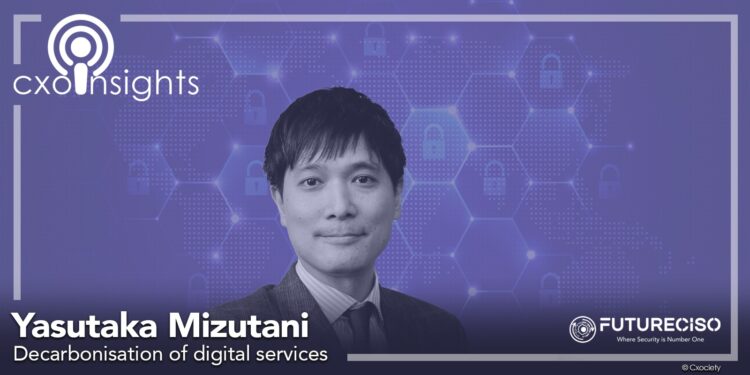"The jury has reached the verdict, and it is damning," says António Guterres, the secretary general of the United Nations, in a riveting speech in 2022. He adds that the world is on a "fast track to climate disaster" and dangerously close to a "tipping point that could lead to cascading and irreversible climate impacts." The Guardian reported that the Intergovernmental Panel on Climate Change says the world "only has a narrow chance of limiting global heating to 1.5C above pre-industrial levels and is falling far behind on making the changes needed to transform the global economy to a low-carbon footing."
The call to reduce carbon footprint and rely more on fossil fuels has been getting louder each year, as technologies such as decarbonisation, or the "removal or reduction of carbon dioxide (CO2) output into the atmosphere", become more in demand to limit and reduce carbon dioxide concentrations in the atmosphere.

Yasutaka Mizutani, president of APAC, Colt Technology Services, recognises the importance of decarbonisation. As a leader of a company focused on data centre and office connectivity, Colt's Yasutaka said that the growing demand for generative AI and cloud services drive significant investment in APAC, which he considers an opportunity to build greener network solutions to help customers meet increasing demand while meeting sustainability goals.
"We recognise the importance of measuring and reducing carbon footprints and have reduced emissions by 28% compared to 2019. It is also crucial for us to collaborate with partners to adopt similar measures to reduce the industry's carbon footprint collectively. This holistic approach ensures that we contribute to a sustainable future while meeting the growing demands for digital services," the Colt executive said.
A balancing act
Yasutaka admits that balancing AI investments with ESG goals is challenging, pushing them to use AI for greener solutions, like optimising routes and implementing water cooling in data centres.
There's a significant demand for sustainable data centres due to AI, but no single solution fits all.
Yasutaka Mizutani
"There's a significant demand for sustainable data centres due to AI, but no single solution fits all. We measure and track carbon footprints and are highly rated on global standards like EcoVadis and CDP ratings. Our efforts include updating to more sustainable platforms and integrating ESG criteria into RFPs," he said.
He added that they work with industry partners like Cisco and Fujitsu to develop energy-efficient technologies, focusing on renewable energy.
To foster a culture of sustainability within the company, Yasutaka shared Colt’s practice of monitoring its employees' carbon footprint. "We receive automated reports detailing the CO2 usage of business trips, which are shared with managers. These initiatives are embedded in all business functions with specific ESG targets. Meeting these goals impacts bonuses, ensuring accountability and progress toward reducing emissions," he added.
Aside from that, he said that it is important to ensure that their suppliers align with the company's ESG goals. "We share our concerns and requirements with partners like Nokia, CNR, Cisco, and Fujitsu upfront. Our multi-vendor strategy allows us to select partners committed to reducing footprints. Aside from that, we are heavily involved in designing next-generation equipment to meet these goals, ensuring that our entire supply chain is aligned with our sustainability targets and efforts," Yasutaka explained.
As a member of the British Chamber of Commerce in Japan, he said Colt shares best practices in the UK with markets in other APAC cities to influence and improve decarbonisation efforts. He said the cross-regional approach ensures consistent progress towards sustainability.
"Enhancing the demand for renewable energy in regions like APAC is vital. This strategy involves replacing fossil fuel-based energy production with renewable sources, promoting a sustainable future. Our multi-vendor approach allows us to select the best technologies for reducing our environmental impact," he said.
AI and decarbonisation
Yasutaka believes that the rapid adoption of AI can slow down decarbonisation efforts due to increased power demands.
"We explore solutions like edge computing to offload workloads and reduce power consumption. Implementing algorithms to optimise platform usage can also help mitigate the environmental impact of AI. However, the industry must collectively adopt these measures to ensure significant progress," he said.
He urges leading companies to collaborate to significantly reduce their carbon footprint and help balance AI growth with decarbonisation goals.
Challenges and advice
Yasutaka said the main challenge is explaining ESG initiatives to shareholders and setting tangible outcomes.
"While senior executives push for ESG goals, working-level staff may not have KPIs related to ESG, focusing more on efficiency and cost management. Bridging this gap is crucial for effective implementation and achieving sustainability targets," he said.
He explained the importance of dealing with CIOs and operations teams regarding carbon initiatives, underscoring that ESG conversations should happen at all levels, "However, in APAC, ESG discussions are more common at the senior level, whereas, in other regions, they also occur at the working level. This comprehensive engagement ensures that ESG goals are integrated across all organisational layers," he said.
Yasutaka also encourages other organisations to follow decarbonisation initiatives, such as replacing used energy with renewable energy, even though he admits it requires a more considerable investment.
If the demand for renewable energy increases, the supply will follow.
Yasutaka Mizutani
"If the demand for renewable energy increases, the supply will follow. This is particularly important in APAC, where there is less focus on renewable energy. Enhancing demand and replacing fossil fuel-based production are key steps towards decarbonisation," he said.
"Set science-based targets," Yasutaka advises CIOs. He said technology leaders need to start by knowing how much CO2 they are producing and where they currently stand in their decarbonisation goals.
"By establishing clear targets based on scientific data, companies can effectively plan and achieve their sustainability goals, ensuring accountability and progress towards reducing emissions. So, targeting is the first thing I recommend everyone to start looking into," Yasutaka said.




